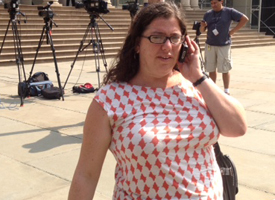WEB EXCLUSIVE: Social Justice on the Go
Janice Gallagher ’99 barnstorms the country with a Caravan for Peace

Janice Gallagher ’99 is working hard to promote peace with justice and dignity on both sides of the United States–Mexican border.
When renowned Mexican poet Javier Sicilia’s son, Juan Francisco, was killed in a drug-related shootout in March 2011, the soft-spoken bard put down his pen and took up a megaphone. Launching the Movement for Peace with Justice and Dignity (MPJD), Sicilia united a vast group of drug war victims—families who had lost innocent loved ones in the crossfire of Mexico’s escalating conflict. They filled dozens of caravan buses and traveled across Mexico telling their stories and drawing attention not only to the heavy hand of state security forces but also to the corruption of the court system, police forces, and politicians who were unable to hold killers and traffickers accountable.
Enter Janice Gallagher ’99, a political-science doctoral student at Cornell University who is investigating the impact of human-rights organizations on policy, media, and legislative outcomes in Mexico and Colombia. Intrigued by the MPJD’s tactics, Gallagher accompanied the movement and one of its caravans across Mexico last year, taking notes, conducting interviews, and documenting human-rights abuses.
With her fluent Spanish and expertise in social justice, she was soon drawn inside the movement and asked to coordinate a monthlong caravan across the United States, which began Aug. 12.
The overarching purpose was to unite the Mexican and American communities, both of which were victims of the drug war, to press for more humane policies on arms trafficking, money laundering, and drug prohibition. With American mothers of incarcerated young men speaking alongside Mexican mothers of disappeared police officers, the gang warfare of inner-city Baltimore, for example, would thus be linked to the narcotrafficking tragedies of the Mexican city of Juarez. And the dire need for change in both countries would become clear.
“This type of binational organizing around a single cause had never been done on this scale before,” says Gallagher.
If it weren’t for William R. Kenan Jr. Professor of Political Science Kenneth Sharpe and former Swarthmore professor Meta Mendel-Reyes, Gallagher might have refused the opportunity, citing a conflict of interest. After all, how could an academic researcher remain analytically objective while participating in and influencing the course of a social movement?
“My background at Swarthmore instilled in me this idea that you don’t have to choose between being a scholar or an activist. I discovered later that not everyone thinks that,” she says, laughing. “But when I found myself in a position within the MPJD, still doing things relevant to my scholarly interests, I realized I was perfectly positioned to contribute to the movement. Co-organizing the Caravan for Peace resonated deeply with my education, which naturally joined activist work and scholarly interests,” she explains.
Gallagher, with organizers at Global Exchange, was in charge of forging alliances and envisioning a unified strategy with the more than 100 nonprofit groups and social movements in the United States that supported the Caravan, from the NAACP to the Washington Office on Latin America, to the Drug Policy Alliance. She also oversaw logistics—making sure the 120 participants were fed and sheltered, mostly in churches, as they traveled in buses from Tijuana to Washington, D.C., with 25 stops in between.
She also found herself crafting the group’s mission statement, singing for video soundtracks, MC-ing several events, and providing moral support for the presenters, who told their wrenching stories of murdered and disappeared family members to supportive crowds in city after city. The caravan culminated with hearings in both the U.S. Senate and in the House of Representatives and more than 30 meetings with congressional representatives.
“I’ve never been so exhausted in my life,” Gallagher said, after leaving Washington, D.C., on Sept. 13. But her research schedule didn’t allow her a moment’s rest: Gallagher headed immediately to Bogota, Colombia, to continue her research and document her experiences.
For more information, and to follow the MPJD movement, visit www.caravanforpeace.org.
 Email This Page
Email This Page